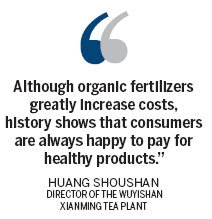Farmers brew up wealth with native cup of tea
Updated: 2013-08-20 07:59
By He Na and Hu Meidong (China Daily)
|
|||||||||||
Healthy development
The promising market for Dahongpao in recent years has resulted in tea companies springing up all over the city.
"Competition is the engine that has driven the industry to upgrade technologically and pursue a higher level of quality. However, disorderly competition could ruin the industry, especially in terms of the environmental toll," said Huang Shenghui, chairman of the Ruiquan Tea Co.
"The high quality of Wuyi rock cliff tea mainly lies in the well-preserved natural environment and ecological chain," he said.
The Ruiquan brand is more than 300 years old. Although the company owns more than 67 hectares of tea plantations, the annual yield is restricted to just 20,000 kg to ensure the quality remains as high as possible. Ruiquan is one of the very few tea companies in Wuyishan that conducts business overseas, with 20 percent of its products exported.
"Tea plantations make high demands on a place. It needs the right environment and the correct amount of sunshine, which means not every place is suitable to be a tea plantation. Blind expansion will destroy the ecological balance and that could deal a devastating blow to the local industry."
Huang's comments were echoed by Yu Daihua, president of Jiulongpao Tea Co, one of Wuyishan's top 10 tea businesses.
"Wuyi Mountain is the best advertisement for the city's tea industry and to protect our own interests, we need to safeguard our best asset," said Yu, referring to the fact that unrestricted competition has caused confusion in the market for Dahongpao tea, because the high-quality leaves are now being mixed with inferior teas.
"The best way to solve the problem is to build consumer confidence by only using the best brands," Yu said.
He stressed that a common misunderstanding should be cleared up; many consumers believe that unless tea comes from one of the six mother trees, it is not real Dahongpao. Yu emphasized that this is simply untrue: "Currently most Dahongpao tea trees are vegetative-propagated, which means they have been grown from cuttings from the mother trees. They maintain the high quality associated with the mother trees and we can honestly say that the tea we're producing now is even better than before."
Zhang Guangcheng, manager of Lyuzhou Tea Co, said the popularity of Wuyi Mountain tea has prompted other companies and farmers in the areas surrounding Wuyishan and even further afield to cite Wuyi Mountain as their point of origin. That has greatly harmed the development of Wuyishan's tea industry, he said. He urged the government to take measures to ensure that the genuine brands are protected.

According to Huang Shoushan, director of the Wuyishan Xianming Tea Plant: "Food safety has attracted increased attention in recent years, as a result of several scandals, so safety should always be our top priority. Although organic fertilizers greatly increase costs, history shows that consumers are always happy to pay for healthy products."
He called on the government to strengthen measures to crack down on counterfeit products and the substitution of high-quality goods with inferior items.
He also suggested that the Wuyishan government should learn from the measures taken by the Guangdong No 1 Tea Trade Market, which demands valid certificates of product inspection as an entry qualification for traders.
To guarantee the validity of the certificate, the market conducts random inspections of the goods to ensure that they are of the highest quality and that consumers are not cheated.
Sun Li contributed to this story.
Related Stories
Tea farms wither amid heatwaves in E China 2013-08-10 11:43
Tea for thought 2013-07-29 17:44
Experts brew ideas for China tea 2013-05-27 02:16
Today's Top News
Snowden reporter to publish UK secrets
Egypt's Mubarak may be freed
Typhoon wreaks havoc in the south
Western program new engine for growth
Hebei province to cut steel capacity
Bank's position to stay 'prudent'
ROK-US drill goes ahead as tensions ease
Manners still missing in overseas travel
Hot Topics
Lunar probe , China growth forecasts, Emission rules get tougher, China seen through 'colored lens', International board,
Editor's Picks

|

|

|

|

|

|





